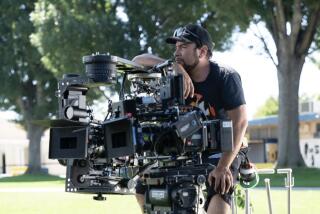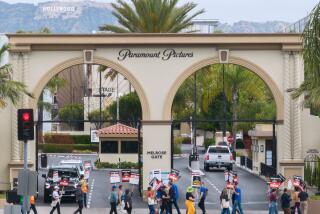Mayor Takes the Stage in Hollywood Strike Scene
- Share via
Fearing that a strike by writers and actors against Hollywood studios could cripple the Los Angeles economy, Mayor Richard Riordan plans to wage a city-funded public relations blitz aimed at pressuring both sides into settling.
Riordan is expected today to announce the start of an economic impact study that will serve as the cornerstone of a campaign stressing the financial damage a strike would cause.
“This is not just a game played between the studios and the other side,” Riordan said in an interview. “This affects the whole city.”
Traditionally, major political figures have kept their distance from labor disputes involving the entertainment industry. But given the high stakes involved and serious consequences of possible back-to-back walkouts, Riordan said, he has decided to make labor peace a priority in his remaining three months in office.
Riordan’s determination to try to head off a strike comes as talks between studios and writers, whose contract expires May 2, have stalled. Negotiations have yet to start between studios and actors, whose contract expires July 1. Writers and actors want a boost in payments, arguing that they are being shortchanged when their work appears on cable TV, in foreign markets and on videocassette or DVD.
Riordan has hired a private company, Edelman Public Relations Worldwide, to publicize the consequences of two possible strikes. The cost of the public relations campaign and the economic study--estimated at $45,000 to $60,000--will be paid by the city from a mayoral discretionary fund.
Riordan said he chose to exert his influence before a possible strike because “I’m more conscious about all of the effects. . . . People seem to be rattling their sabers more now, and this got to the top of my radar screen.”
The mayor’s involvement took both writers and studios by surprise.
Cheryl Rhoden, assistant executive director of the Writers Guild of America, said the guild was unaware of Riordan’s plan but has no problem with it.
“It’s the right of any elected official to . . . bring whatever pressures they can on the respective sides to try to make a deal,” Rhoden said.
J. Nicholas Counter, chief negotiator for the Hollywood studios, said he also had no knowledge of the mayor’s plan.
“My feeling is he’s doing what he should do,” Counter said. As to the need to educate the studios, Counter said: “We’re well aware of the economic impact the industry has in the Los Angeles area.”
For the last few weeks, Riordan said, he has discussed a possible strike with Counter, Screen Actors Guild President William Daniels, other union leaders and major industry figures, including patriarch Lew Wasserman, who for decades brokered Hollywood’s labor deals.
Riordan said he is optimistic that there will not be a strike. Nonetheless, his actions show how seriously public officials are now taking threats of one. Fears of a work stoppage have been exacerbated in recent weeks by thousands of job cuts by major entertainment companies and by the softening in the overall economy.
Riordan’s action marks an about-face from last year, when he and virtually all other public officials were invisible during the six-month strike by actors against the advertising industry. That strike cost Southern California an estimated $125 million in lost production.
“As far as I know, he didn’t do [much] on the commercial strike,” SAG spokesman Greg Krizman said. “We would have appreciated efforts from wherever to help bring about the end of the work stoppage.”
Riordan, who generally has enjoyed strong support from much of the city’s increasingly influential organized labor movement, also was criticized for failing to get involved early in last year’s transit strike, during which he spent several days bicycling in France. He said he was in constant contact with city officials, and when he returned to Los Angeles, the mayor was a visible player in the group that eventually struck the deal to end the walkout.
Riordan’s economic study will be conducted by the Milken Institute, an economic think tank in Santa Monica, and Sebago Associates Inc., a Marina del Rey public policy consulting firm. It will be unveiled next week, coinciding with the expected resumption of contract talks between the Writers Guild and Hollywood’s major studios. The writers and studios plan to take one more stab at negotiating a new deal before their current one expires on May 2.
To date, the only estimate on the strike’s potential impact has come from the Los Angeles County Economic Development Corp., which broadly pegs it at $250 million a week in direct costs to the industry and an additional $247 million weekly in indirect costs as the strike ripples through other Southern California businesses.
The Milken/Sebago study is expected to paint three scenarios, starting with a mild strike in which writers walk out for two months and actors don’t. The second, harsher scenario will project what would happen if writers strike for three months and actors for one. A third, more severe scenario has writers striking for five months and actors for three. The study also is expected to more clearly detail job and income losses across Southern California’s economy, along with tax revenue losses.
Riordan described his role as more “cheerleader” than “mediator.”
Riordan said he plans to use the study to educate both sides on the potential impact of a strike. He also will stress the role that entertainment played in helping pull Los Angeles out of its economic malaise in the early 1990s, and point out that a strike would severely hurt both tax revenues and city services.
“I want to let everybody know what the strike is going to do to their city, to the restaurants, the barbers, the accountants and to the value of their homes,” said Riordan, who leaves office July 1.
The Writers Guild in the past has taken issue with economic impact estimates, noting that much of the work shelved during strikes is merely postponed, not scrapped altogether. Writers also caution that the studies don’t measure the economic impact of inadequate contracts.
“To date, the emphasis is on what is the cost of a work stoppage,” Rhoden said. “But the other impact is if the artists in this community do not keep pace and fall further and further behind.”
Mayor Drops Hollywood Names
Riordan has close ties to Hollywood. During an hourlong interview in his City Hall office last week, Riordan frequently dropped names of stars and moguls. He said he discussed the strike with actors Warren Beatty and James Woods during opening day at Dodger Stadium. He takes annual bicycle trips with Walt Disney Chairman Michael Eisner and USA Network chief Barry Diller, skis with Viacom Entertainment Chairman Jonathan Dolgen and has dinner four times a year with News Corp. Chairman Rupert Murdoch.
Riordan said that he would have taken a more active role as a mediator in the writers and actors dispute, but was advised by Wasserman and others that it would be inappropriate.
In his two-hour meeting with Wasserman at the mogul’s Beverly Hills home, Riordan said Wasserman told him that “I shouldn’t try to be involved in shuttle diplomacy, but I could be the father figure to try and tell people this is going to hurt the city and you better get it done.”
More to Read
Inside the business of entertainment
The Wide Shot brings you news, analysis and insights on everything from streaming wars to production — and what it all means for the future.
You may occasionally receive promotional content from the Los Angeles Times.










